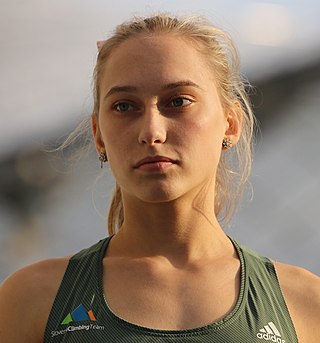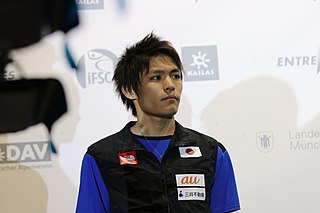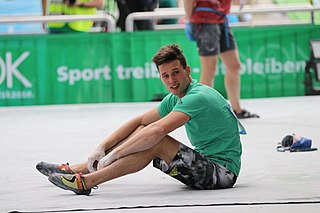
The bouldering events at the 2015 IFSC Climbing World Cup took place in various countries between May and August of that year. The winners were awarded trophies, the best three finishers received medals, and prize money was awarded to the top six finishers at each stop. At the end of the season an overall ranking was determined based upon points, which athletes were awarded for finishing in the top 30 of each individual event. Akiyo Noguchi won the overall women's World Cup and Jongwon Chon won the overall men's World Cup.

The 2016 season of the IFSC Climbing World Cup was the 18th season of the competition. Bouldering competitions were held at the seven stops of the IFSC Climbing World Cup. The bouldering season began on April 15 at the World Cup in Meiringen, and concluded on 12 June at the World Cup in Munich. At each stop a qualifying was held on the first day of the competition, and the semi-final and final rounds were conducted on the second day of the competition. The winners were awarded trophies, the best three finishers received medals, and prize money was awarded to the top six finishers at each stop.

Janja Garnbret is a Slovenian rock climber and sport climber who has won multiple lead climbing and bouldering events at climbing competitions. In 2021, she became the first ever female Olympic gold medalist in sport climbing, and is widely regarded as one of the greatest competitive climbers of all time. She is also the world's first-ever female climber to onsight an 8c (5.14b) graded sport climbing route. As of the end of 2022, Garnbret had won the most IFSC gold medals of any competitive climber in history.

Akiyo Noguchi is a Japanese professional rock climber, sport climber and boulderer.

Tomoa Narasaki is a Japanese professional sport climber and boulderer.

The 2017 season of the IFSC Climbing World Cup was the 19th season of the competition. Bouldering competitions were being held at seven stops of the IFSC Climbing World Cup. The bouldering season began on April 7 at the World Cup in Meiringen, and concluded on 19 August at the World Cup in Munich. At each stop a qualifying was held on the first day, and the semi-final and final rounds were conducted on the second day of the competition. The winners were awarded trophies, and the best three finishers received medals. At the end of the season an overall ranking was determined based upon points, which athletes were awarded for finishing in the top 30 of each individual event. Shauna Coxsey won the women's World Cup and Jongwon Chon won the men's World Cup.

Miho Nonaka is a Japanese competition boulderer. She competed at the 2020 Summer Olympics, in Women's combined, winning a silver medal.

Jernej Kruder is a Slovenian boulderer, sport climber and rock climber. In 2018, he won the IFSC Climbing World Cup in bouldering.

The 2018 IFSC Climbing World Championships, the 15th edition, were held in Innsbruck, Austria from 6 to 16 September 2018. The championships consisted of lead, speed, bouldering, paraclimbing, and combined events.
The 2017 IFSC Climbing World Cup was held in 15 locations. Bouldering competitions were held in 7 locations, lead in 8 locations, and speed in 7 locations. The season began on 7 April in Meiringen, Switzerland and concluded on 12 November in Kranj, Slovenia.
The 2018 IFSC Climbing World Cup was held in 14 locations. There were 22 events: 7 bouldering, 7 lead, and 8 speed events. The season began on 13 April in Meiringen, Switzerland, and concluded on 28 October in Xiamen, China.
The 2016 IFSC Climbing World Cup was held in 16 locations. Bouldering, lead and speed competitions were held in 7 locations. The season began on 15 April in Meiringen, Switzerland and concluded on 27 November in Kranj, Slovenia.
The 2019 season of the IFSC Climbing World Cup was the 21st season of the competition. Bouldering competitions were held at six stops of the IFSC Climbing World Cup. The bouldering season began on April 5 at the World Cup in Meiringen, and concluded on June 8 with the World Cup in Vail. At each stop a qualifying was held on the first day of the competition, and the semi-final and final rounds were conducted on the second day of the competition. The winners were awarded trophies, and the best three finishers received medals. At the end of the season an overall ranking was determined based upon points, which athletes were awarded for finishing in the top 30 of each individual event.
The 2019 IFSC Climbing World Cup was held in 12 locations. Bouldering, lead and speed competitions were each held in 6 locations. The season began on 5 April in Meiringen, Switzerland with the first bouldering competition in the season, and concluded on 27 October in Inzai, Japan, with the last lead climbing competition in the season.
The 2019 Combined Japan Cup was the second of the competition. It was organized by the JMSCA. It was held from 25 to 26 May 2019 in Saijō city, Ehime Prefecture. The athletes competed in combined format of three disciplines: speed, bouldering, and lead. The winner for men was Tomoa Narasaki and for women was Miho Nonaka.

Ai Mori is a Japanese professional rock climber, sport climber and boulderer. At the 2019 IFSC Climbing World Championships, she became the youngest Japanese athlete to finish in a podium place in the competition, third in lead. She has won Japan Cup titles in both bouldering and lead disciplines, and has multiple IFSC Climbing World Cup podium finishes, including three gold medals in World Cup events in 2022.
The 2021 IFSC Climbing World Cup was the 33rd edition of the international sport climbing competition series, held in seven locations. There are 11 events: four bouldering, five lead, and two speed events. The season began on 16 April in Meiringen, Switzerland with the first bouldering competition in the season, and concluded on 4 September in Kranj, Slovenia. The International Federation of Sport Climbing had initially scheduled 18 events concluding on 31 October, but COVID-19 travel restrictions resulted in the cancellation of events in Xiamen and Wujiang in China, Jakarta in Indonesia and Seoul in South Korea.
The 2021 season of the IFSC Climbing World Cup was the 22st season of the competition. Bouldering competitions will be held at six stops of the IFSC Climbing World Cup. The bouldering season began on April 16 at the World Cup in Meiringen, and concluded on 26 June with the World Cup in Innsbruck. The International Federation of Sport Climbing had initially scheduled six bouldering events concluding on 24 October, but COVID-19 travel restrictions resulted in the cancellation of events in Wujiang in China and Seoul in South Korea.
Lead climbing competitions at the 2019 IFSC Climbing World Cup were held at six locations, from 4 July to 27 October 2019. The top three in each competition received medals, and at the end of the season, the overall winners were awarded trophies. The overall winners were determined based upon points, which athletes were awarded for finishing in the top 30 of each individual event. Adam Ondra won the men's seasonal title, Chaehyun Seo won the women's seasonal title, and Japan won the national team title.
The 2022 IFSC Climbing World Cup is the 34th edition of the international sport climbing competition series organised by the International Federation of Sport Climbing (IFSC), held in 12 locations. There are 21 events: six bouldering, seven lead, seven speed, and one bouldering & lead combined events. The series began on 8 April in Meiringen, Switzerland with the first bouldering competitions of the season, and concluded on 22 October in Morioka-Iwate, Japan, which introduced the Boulder & Lead combined format that will be used at the 2024 Summer Olympics in Paris.











